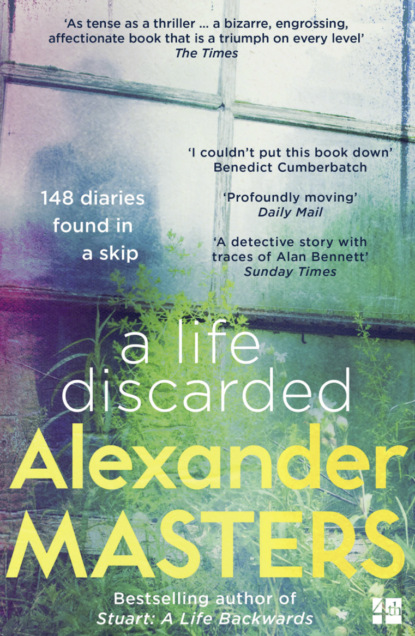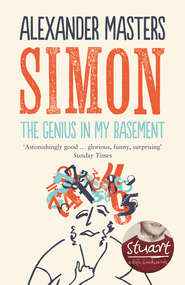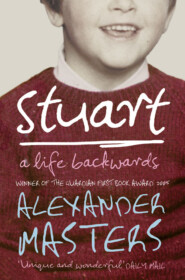По всем вопросам обращайтесь на: info@litportal.ru
(©) 2003-2024.
✖
A Life Discarded: 148 Diaries Found in a Skip
Настройки чтения
Размер шрифта
Высота строк
Поля
23. Who E? (#litres_trial_promo)
24. Despite the fact that time passes with treacle-like languor … (#litres_trial_promo)
25. Who E? (cont.) (#litres_trial_promo)
26. For years, Flora has been telling me … (#litres_trial_promo)
Part Two: Crisis (#litres_trial_promo)
27. The End of history (#litres_trial_promo)
28. Auntie’s Tea Shop is a seaside shop … (#litres_trial_promo)
29. Hello! Are you Laura Francis? (#litres_trial_promo)
30. Epitaph (#litres_trial_promo)
Part Three: Biography (#litres_trial_promo)
31. Laura Penrose Francis (#litres_trial_promo)
32. PS (#litres_trial_promo)
Footnote (#litres_trial_promo)
Acknowledgements (#litres_trial_promo)
Also by Alexander Masters (#litres_trial_promo)
About the Publisher (#litres_trial_promo)
A nice day in general; just enjoying myself.
No particular thoughts, except perhaps
I’d like to change my life.
PART ONE (#ulink_4234f36e-3d75-5049-91ea-b14f6fb3e716)
1 2001: The Skip (#ulink_3f702f0c-ddf6-5635-b519-7a83b303564e)
One breezy afternoon, my friend Richard Grove was mooching around Cambridge with his shirt hanging out, when he came across this skip:
Only partially filled, it was resting in an old yew hedge, on a stub of dead-end road. Richard squeezed between the scuffed yellow metal and the hedge and wandered through what had once been an old orchard. Tree stumps, sliced off at ankle height, glistened smoothly in the sun. Pear and apple branches were piled up beside a wood-chewer, waiting to be turned into chips. Beyond this cleared woodland, spreading like a pool of bleach among the grass and flowers, was a building site. A large Arts and Crafts house was being modified. The roof had gone. Underneath, two storeys of red brick walls were cordoned off by corrugated metal fencing. It seemed the property was being exposed to the wind for a good rinse-out. A lot of ancient professors live in this part of Cambridge, dozing on their laurels, shuffling about in worn-out cars. They give the place a musty feel; it needs the occasional airing.
Although Richard had lived nearby for most of his life, this house was so well hidden behind hedges and trees that he hadn’t known it existed. By pressing his eye against a gap between the metal fencing posts, he could see the remains of a porch. The wooden column holding up the roof had been snapped, like a knee.
Richard returned to the skip, peered in and became suddenly agitated. Something inside had caught his attention. He stood on tiptoe in an attempt to put his arms over the top and reach down, but his arms weren’t long enough. With his shoulders still hunched over the metal, he slid along the skip until he reached the low end and, after looking around unsuccessfully for something to stand on, tried to tip himself over the edge and slide in – but he wouldn’t tip. Professor Richard Grove is an energetic man, a world expert on the ecology of islands, and always eager to get himself dirty; but he’s a little plump. Defeated by the skip, he ran off. Half an hour later he reappeared with Dr Dido Davies who is thinner.
Dido clambered in easily (by the tipping method) and slid down the metal slope until her feet rested on a large box. A plastic bath panel split and gave way. Dido dropped half an inch. Something collapsed with a metallic sigh. Dido fell to her hands. Dido – a historian, an award-winning biographer, author of two sex manuals under the pseudonym ‘Rachel Swift’ and the only person in the world who knows where the bones of Sir Thomas More are buried – could see exactly what had made Richard so excited.
Clustered inside a broken shower basin, wedged into the gaps around a wrenched-off door, flapping in the breeze on top of the broken bricks and slates, were armfuls of books. They had been scattered across the rubble exultantly and anyhow. ‘They couldn’t have been there more than an hour or two, they looked so fresh,’ remembered Dido years later. ‘It felt as though the person who had thrown them might be still in the garden, but Richard and I looked – nobody was there. I thought, has someone thrown them away because they’ve gone loony? Has someone come along after the owner has died and tossed the books out in a fit of rage?’
The discovery reminded her of a story about the Cambridge literary critic Frank Kermode. ‘Kermode was moving house, and he had this incredibly important library, all first editions, all signed to him by the authors, all boxed up. But somehow he accidentally gave the boxes to the dustbin men instead of the removal men, and this very personal collection was carted off. He never saw the books again. It was the same with these books in the skip: a feeling of wronged privacy. It was so obvious that they shouldn’t be destroyed. You wanted to pick them up. It was nothing to do with keeping them. Just to save them, because whoever had thrown them in the skip had run off only a few minutes ago. These books were alive.’
A few of the volumes had royal emblems embossed on the front:
Others were cheap
exercise pads in stale grey-blue. Many were plain, good-quality hardbacks in old-fashioned, accountancy-office red, stamped with gold letters: ‘Heffers, Cambridge’. Others were thin and black, with illustrated boards that might have been based on neurological patterns, and therefore belonged in a medical lab. There were jotters of the sort 1950s policemen brought out of their breast pockets, and small, plump ledgers that I last remember seeing in my school uniform shop in the 1970s. Some of the books had been partially destroyed by water that had long since dried out. The corners of the paper stuck in blocks; stains of rotting metal seeped into the pages from the staples. A box, big enough to contain a head, had landed further into the skip and split with the impact. Inside were more volumes, with covers ranging from post-war sugar card to glistening, oily hardbacks that looked as though they’d been bought that morning. The box had jaunty green print on the sides: ‘Ribena! 5d off!’
A chalky notebook that Dido picked up broke like chocolate. Inside, the rotted pages were filled with handwriting, right up to the edges, as though the words had been poured in as a fluid.
It was a diary.
All the 148 books in the skip were diaries.
2 The Ribena box (#ulink_406eb711-7799-5842-8b4e-018378ae2409)
Aged twelve
A person can write five million words about itself, and forget to tell you its name.
Or its sex.
People don’t include obvious identifiers in diaries: things such as what they’re called or where their home is. They are simply ‘I’, who lives.
And then dies, and gets dumped in a skip.
It was evident that the author had died. People might burn their intimate diaries before they die, but they don’t throw them out where any stranger can pick them up.
Two terrible things happened after the discovery of the diaries.
Richard was being driven home from a party, in Australia, when the driver fell asleep and crashed the car into a tree. One of the most courageous and inventive academics of his generation, he is still alive, jolting in a wheelchair, and being moved around the nursing homes of England.
Several years later, Dido, my writing collaborator for a quarter of a century, was diagnosed with a ten-centimetre neuroendocrine tumour on her pancreas. I went with her to hear the diagnosis. There aren’t that many times I’ve seen real courage – the sort that makes you start with admiration each time you remember it. Top of my list for biblical chutzpah is Dido’s bemused calm as we came out of the GP’s surgery. ‘Well, I’ve had a nice life,’ she said. ‘Now, shall we go through these pages of yours in Waitrose’s café? It’s cooler there.’
A few weeks later she began to clear out her house. She had not progressed far with discovering who owned the diaries. As well as no name or return address, on the pages inside there were no obvious descriptions of the writer’s appearance, his or her job, or identifiable details of friends or family members. Everything that a person uses to clarify themselves to another person was missing. Why should ‘I’ bother to put them there? ‘I’ knew them already.
What could Dido do with this journal? She couldn’t take it to the police – they’d laugh at her. She couldn’t burn it – that would be criminal.
She gave them to me. It was now my job: I was to find out who was the rightful heir of these ‘living books’, and return them.
She’d put the diaries in three boxes. The original Ribena bottle crate had no lid; one side was caved in and the top half-shut-up, like a punched eye. The last person to touch this box before Dido was the person who’d thrown it out. There was nothing written on the outside except those shouts about ‘5d!’ No packaging label. Nothing with an alternative address. One of the hand holes was ripped clean in half.
The biggest box was thin, plain and approximately the length of a thigh. It bulged meatishly. Through the gaps in the cardboard I could see strips of lurid-coloured modern journals.
The third container was torso-sized and originally for a Canon portable photocopier (‘ZERO warm up time’). It was shiny and strapped down with duct tape. On one edge there was a label, addressed to The Librarian, Trinity College, Cambridge.







